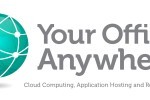Cloud or online hosting of Microsoft Access databases is becoming more and more popular, and for many businesses it can be a far more flexible and cost effective way of managing and sharing business information than web based alternatives.
ereIn this article I’m going to concentrate on hosting Access databases using Microsoft terminal services (also known as Hosted Applications, Remote Applications, RemoteApps or WebApps). While there are other methods for example using hosted SharePoint in Office 365 I’ve not heard good reports about these.
hosted terminal serverAs there are remote desktop clients for nearly all types if devices users can work on the hosted database application using PCs, Macs, iPads and Android tablets. The remote desktop client will allow users to run either a full remote desktop, or more commonly just the remote Access database application which launches from an icon on their Start Menu. It is also possible to run the application in exactly the same way straight from a web browser. Handy if you are working on a strange PC in a hotel or airport.
It’s worth noting that Hosted Terminal Services is not the same as a remote virtual desktop. Virtual desktops running a Windows desktop operating system such as Windows 7, 8 or 10 won’t necessarily provide you with the ability to run Access as a Remote Application (RemoteApp) or via a web browser.
Of course it is also possible to run the Access database on a local server and many companies do this, but for businesses who don’t have an existing local server or are looking to replace local infrastructure with cloud technologies there are many benefits to using a hosted service:
• Updated versions of the database only need to be deployed once, not to every PC.
• Hosted servers are usually protected by enterprise level firewalls, redundant power supplies, emergency battery power and diesel generators as well as 24 hour security. They also have central Anti-virus and Windows update management.
Hosted terminal servers will also allow you to integrate other applications with Access, for example other Microsoft Office application like Word, Excel or Outlook as well as running other non-related applications in the cloud. In fact nearly everything written here applies equally to any other database application, examples include Sage, IRIS, Quickbooks and ACT!
Your Office AnywhereEnjoyed this? Read more from Your Office Anywhere






















